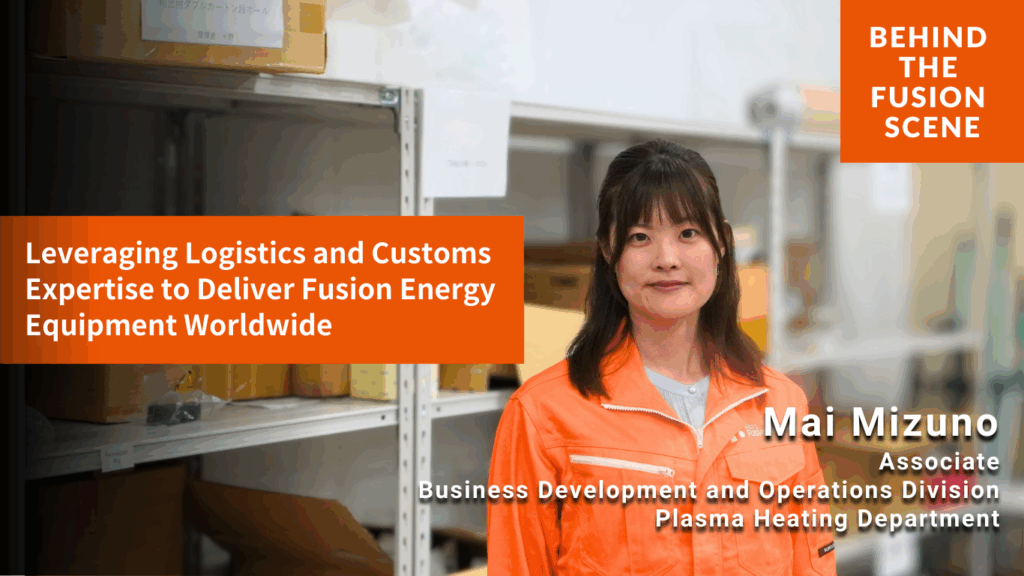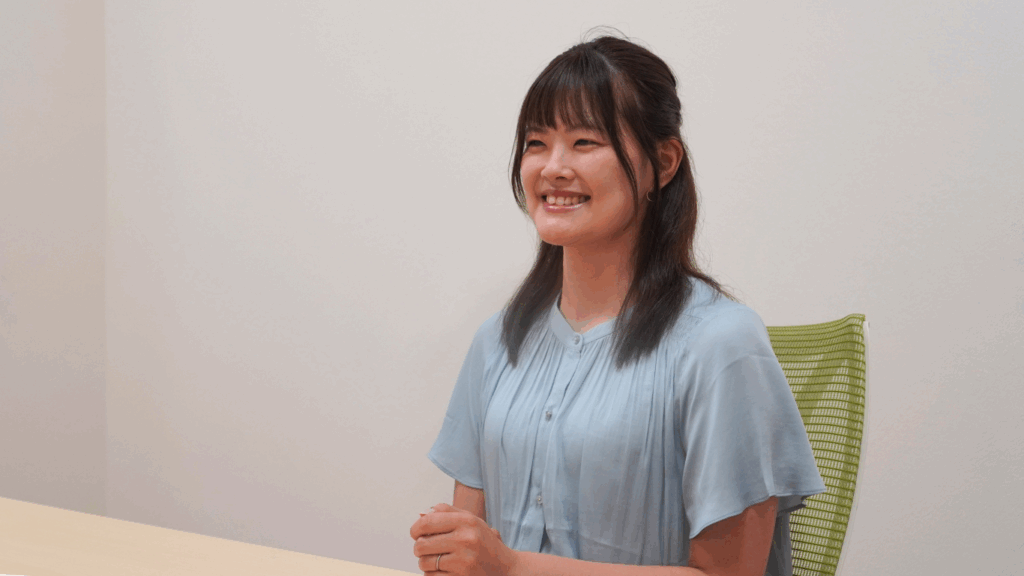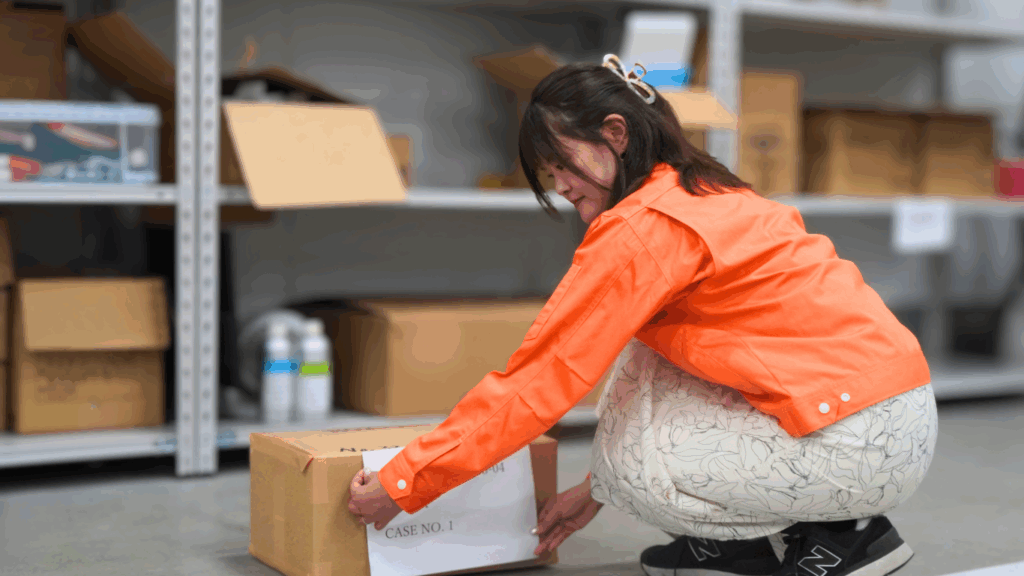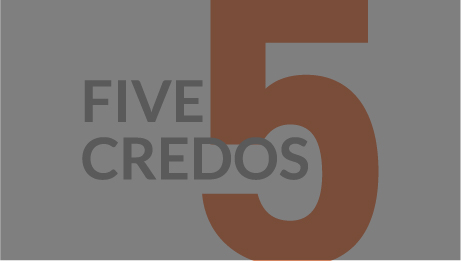
In a nutshell:
Mai Mizuno joined Kyoto Fusioneering (KF) in October 2022 as part of the General Affairs team. Since then, she has expanded her scope well beyond her initial role—taking on responsibilities in general admin, legal, IT, and accounting, while also applying her career expertise in export control.
Today, she plays a key role in overseeing KF’s global trade operations, ensuring the smooth export and import of our products—including the gyrotron systems now being delivered to customers around the world.
You’re currently in charge of trade operations at Kyoto Fusioneering (KF). Could you tell us about your career journey so far?
My career began at a logistics company I joined right after graduating university. I was motivated by a desire to “be helpful to others,” and during my job search, I realized that logistics act as a backbone of global society—quietly supporting people’s lives around the world. That scale and impact drew me to the industry.
I was first assigned to the air freight department, where I worked on document verification, cargo inspection, and customs procedures. Air freight is always a race against time, demanding both speed and initiative. Rather than structured training, I learned by watching more senior team members and taking action. As a new graduate, the pace was overwhelming at first, but I pushed myself to keep up with the fast-paced environment.
Later, I was transferred to the sales department and took on customer relations. Initially, I felt a little insecure as I was still getting used to export operations, but I chose to see it as an opportunity to gain new skills and perspectives. In sales, I handled inquiries about exports and proposed tailored solutions, including shipping methods and delivery timelines, while coordinating with internal teams, business partners, and airlines to manage schedules and costs after securing orders.
This role sharpened my ability to communicate with diverse stakeholders and helped me better understand the reasoning behind the requests I used to receive from the sales team as an export operations staff member.
After about three years in logistics, I transitioned into a role as a customs officer, where I inspected cargo and monitored for suspicious items at airports.
What led you to become a customs officer, and what was that experience like?
The move started with a family relocation to another prefecture. Since I knew we’d move again in a few years, I looked for fixed-term positions and found an opening for a customs officer. The role was similar to my previous logistics work and matched the contract length I was looking for, so I applied and was fortunate to be accepted.
At first, I was nervous about joining on a temporary basis, but my colleagues treated me as an equal from day one, which helped me settle in quickly. Thanks to my prior experience with export cargo, I was able to adapt smoothly and contribute right away.
One standout moment was when I successfully identified prohibited items hidden in luggage. That discovery was recognized by both my team and headquarters—a proud moment that validated my efforts. Working at customs gave me unique insight into how officers think, what they prioritize, and how they enforce compliance. That perspective has been invaluable in my current role, where understanding both sides of trade operations helps me ensure smoother operations.

How did you come to join KF after your term at customs ended?
When my contract at customs ended, I returned to the Tokyo area and began looking for a workplace where I could balance work with parenting. At first, I struggled to find options that felt like the right fit, so I registered with a staffing agency. That’s how I was first introduced to KF.
Initially, I hesitated—I assumed KF was strictly a Kyoto-based company and continued to explore other opportunities. But the agency encouraged me to consider KF, explaining that the company’s culture and environment would suit me well.
When I went for the interview, I was warmly welcomed by the staff. It immediately reminded me of my first day at customs, where I felt supported from the very start. I was especially drawn to KF’s inclusive atmosphere, where everyone communicates on an equal footing, regardless of their role or contract type.
That sense of openness and trust inspired me to join KF, starting out as an administrative staff member.
What Have You Been Working on Since Joining KF?
When I first joined KF, the company had only a few dozen employees. At that stage, I supported a wide range of corporate functions—from general affairs and legal to IT and accounting. As projects expanded, I moved into the business division, focusing mainly on trade operations: preparing export documents, tracking shipments, and handling customs procedures.
At the beginning, many tasks were in areas I had never worked in before, like legal and IT, so the learning curve was steep. But thanks to the patience and support of my colleagues, I was able to dive in and adjust quickly. Life in a startup is full of trial and error, and I felt like I was growing alongside the company. What gave me confidence was how many colleagues would take the time—even when they were busy—to explain things carefully.
Before long, I was able to apply my prior trade management experience when we shipped prototypes to international clients. The positive feedback on my work led to broader responsibilities, including coordinating with freight forwarders and preparing customs documents for shipments to organizations like the UK Atomic Energy Authority (UKAEA) and Tokamak Energy in the UK. Around that time, I was offered a full-time position. Since I’ve always wanted to “help others” through my work, being recognized as someone who contributes to the team, the company, and society was deeply meaningful.
Now, as a full-time employee, I focus even more on trade compliance. Transporting fusion-related components is a new frontier: there are few precedents, no standard packaging, and every shipment has unique specifications. To navigate this, I work closely with our technical teams.
Because these devices are not mass-produced and often differ in specification, every shipment must undergo strict checks for export control and hazardous materials regulations. This makes close collaboration with our engineers and legal team essential to ensuring compliance.
We also face the challenge of balancing delivery timelines and costs. To improve safety and efficiency, we’ve started attaching sensors to shipping boxes to monitor vibration and temperature—collecting data that helps refine our processes. Although I began in an administrative role, I now contribute directly to key projects by drawing on my background in logistics and customs. The work can be demanding—especially when urgent responses are required—but it’s also deeply rewarding to apply my experience in trade in a way that supports the global progress of fusion energy.

Finally, what would you like to achieve at KF?
First, I want to see our ongoing gyrotron project through to completion—delivering all the necessary components to our customers and supporting on-site performance testing. While our current focus is on gyrotron systems, we’ll soon begin exporting devices for the fusion thermal cycle system and the fusion fuel cycle system as well.
Many of these exports have just started to be delivered internationally. Through my work at KF, I hope to help establish global standards in partnership with logistics companies and customs authorities.
What makes this work truly meaningful is knowing that the equipment I help transport is directly contributing to research and development that could make fusion energy a reality—and ultimately provide humanity with a new, sustainable source of power. I’m proud to play a part in that mission.




